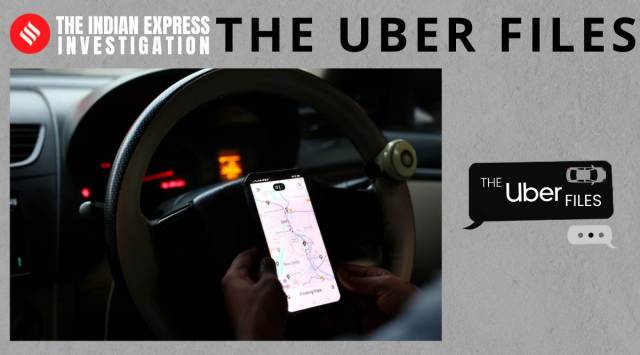- India
- International
Uber’s crisis SOP: hit ‘kill switch’ meaning shut down to deny info
Three months before Delhi rape, Uber Asia chief told India team to ‘embrace the chaos’
 The New Delhi rape case saw Uber being temporarily withdrawn from the Capital’s roads. (Express)
The New Delhi rape case saw Uber being temporarily withdrawn from the Capital’s roads. (Express)Barely one year into its launch in India, on August 23, 2014, Uber’s then Asia Head, Allen Penn, sent an email to the team here: “Embrace the chaos. It means you are doing something meaningful.”
There was some “chaos” a little over three months later — on December 5, 2014, a woman passenger was sexually assaulted in an Uber cab by its driver in New Delhi.
In his August email titled “dealing with regulatory issues,” Penn laid out for his Indian colleagues what it now transpires was a standard operating procedure: how Uber managers should stonewall queries and missives from the government.
While encouraging the team – “Irrespective of what the competition and entrenched interests say, You and Uber are the ones improving India” – he instructed them on how to keep the authorities at bay.
“We will likely have both local and national issues in almost every city in India for the rest of your tenure at Uber… Don’t talk to the Government or folks close to the Government unless you have specifically discussed with Jordan (a reference to Jordan Condo, Uber’s Head of Public Policy for Asia)… we will generally stall, be unresponsive, and often say no to what they want. This is how we operate and it’s nearly always the best. Early quick meetings set us up for failure. Get comfortable with that approach… don’t let it distract you from your mission to dominate the market,” he wrote.

The email is part of The Uber Files investigated by The Indian Express. These records were obtained by The Guardian and shared with the International Consortium of Investigative Journalists with which The Indian Express has partnered for this investigation.
The New Delhi rape case saw Uber being temporarily withdrawn from the Capital’s roads and the ride-hailing service being forced, for the first time in any city in the world, to apply for a licence to manage operations through an Indian subsidiary, and not Uber BV, its international firm located in the Netherlands.
Uber later faced a slew of regulatory issues with the Reserve Bank of India and governmental authorities like the Service Tax, Consumer Courts and Income Tax. And it still does.
Emails and internal documents reveal that India was among the countries where Uber deployed its unique blocking software which company insiders refer to as ‘Kill Switch’ in internal emails.
The ‘Kill Switch’ was meant to be used to switch off systems in the event of serious regulatory action, like a tax raid.
To begin with, Uber used a software named ‘Casper’ and later ‘Ripley’.
The data show 13 instances between 2014-2016 when the ‘Kill Switch’ was used in different cities across the globe. It was used in Amsterdam, Montreal, Hong Kong, Budapest, Lyon and Paris. Travis Kalanick, Uber co-founder and CEO, personally ordered its use in Amsterdam in September 2015.
There are emails that show the ‘Kill Switch’ was also to be used during a tax raid on the company’s offices in Brussels in March 2015, but the sleuths seized staff computers before it could be deployed.
The reference to India comes in confidential emails dated February 10, 2015 — two months after the rape incident in New Delhi and the subsequent ban on its service.
The emails are titled “Uber Belgium/special tax inspectors” and have a context of alleged VAT-return violations committed by Uber-Belgium.
In the emails, it is Uber Manager, Rob van der Woude, who provides a detailed account of how Uber blocked access to its data for Indian authorities.
It states: “What we did in India is have the city team be as cooperative as possible and have BV (the company in Netherlands) take the heat. E.g. Whenever the local team was called to provide the information, we shut them down from the system making it practically impossible for them to give out any info despite their willingness to do so. At the same time we kept directing the authorities to talk to BV representatives instead. Not sure if that works here given they have telco info but that bought us some months there.’’
Evidently, “shut them down” was the norm for Uber managers in territories from India to Paris.
After the Brussels fiasco, the company devised a “dawn raid app” and circulated a “dawn raid manual” among its senior employees. A 10-page manual is also part of the data.
In the manual are detailed instructions on how a “raid” should be managed; how telephone conversations should be sanitised should regulators be tapping phones; how a raid coordinator should be appointed; and, which categories of data can be shared with raid inspectors.
Asked about the frequent use of the ‘Kill Switch’, Uber’s spokesperson in the US, Jill Hazelbaker, and the company’s spokesperson in New Delhi had an identical response: “Uber does not have a ‘Kill Switch’ designed to thwart regulatory inquiries anywhere in the world and has not since Dara Khosrowshahi became CEO in 2017. On the contrary, authorities regularly make requests for information and we routinely cooperate with those requests. While every company has software in place to remotely protect its corporate devices, such software should never have been used to thwart legitimate regulatory actions.”
Allen Penn and Rob van der Woude did not respond to queries.
In India, Uber was forced to make a structural shift in operations from the Netherlands to an India-based subsidiary, Resourcexpert India Private Limited, while in countries like Belgium, it was under pressure from tax authorities to hand over data of drivers who were using Uber phones.
For instance, there is a confidential email from Uber manager Filip Nuytemans, dated February 10, 2015, on the subject of demands for driver data from special tax inspectors. The Uber manager says he was “open to share data as part of a new regulatory reform, but handing out that data now could lead to all those + 500 drivers being 1) prosecuted with risk of permanent seizure of their car plus fine 2) being audited by tax authorities knowing that most of them are not able to declare under current conditions.”
There is also an email – it has the same date — from Uber’s legal counsel Zac de Kievit who said, “Providing the driver list will gut our supply: it makes it much more easier for the taxman, regulators and police to terrify our supply and enforce against it… what is the least bad option here? Drivers being pursued via criminal proceedings or ourselves?… If we hand over the drivers list, our goose may be cooked.”
Following a raid in Uber’s offices in Paris the same year, de Kievit was arrested for obstruction of justice by cutting IT access and activating the ‘Kill Switch’.
May 05: Latest News
- 01
- 02
- 03
- 04
- 05






































